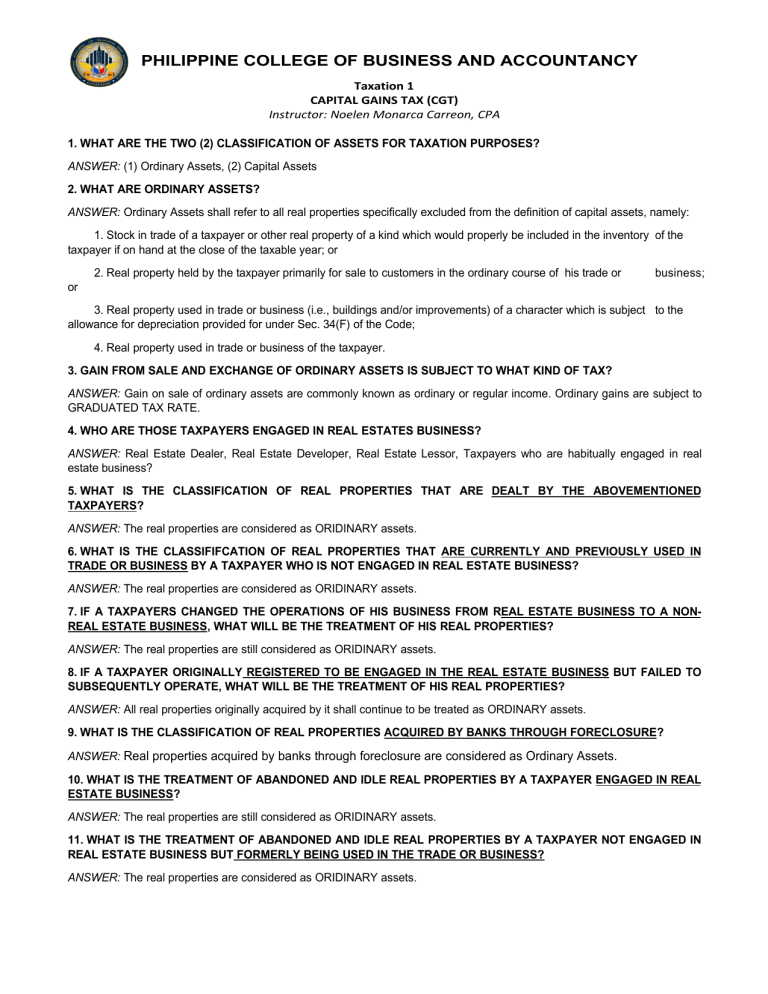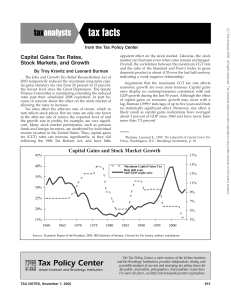
PHILIPPINE COLLEGE OF BUSINESS AND ACCOUNTANCY Taxation 1 CAPITAL GAINS TAX (CGT) Instructor: Noelen Monarca Carreon, CPA 1. WHAT ARE THE TWO (2) CLASSIFICATION OF ASSETS FOR TAXATION PURPOSES? ANSWER: (1) Ordinary Assets, (2) Capital Assets 2. WHAT ARE ORDINARY ASSETS? ANSWER: Ordinary Assets shall refer to all real properties specifically excluded from the definition of capital assets, namely: 1. Stock in trade of a taxpayer or other real property of a kind which would properly be included in the inventory of the taxpayer if on hand at the close of the taxable year; or or 2. Real property held by the taxpayer primarily for sale to customers in the ordinary course of his trade or business; 3. Real property used in trade or business (i.e., buildings and/or improvements) of a character which is subject to the allowance for depreciation provided for under Sec. 34(F) of the Code; 4. Real property used in trade or business of the taxpayer. 3. GAIN FROM SALE AND EXCHANGE OF ORDINARY ASSETS IS SUBJECT TO WHAT KIND OF TAX? ANSWER: Gain on sale of ordinary assets are commonly known as ordinary or regular income. Ordinary gains are subject to GRADUATED TAX RATE. 4. WHO ARE THOSE TAXPAYERS ENGAGED IN REAL ESTATES BUSINESS? ANSWER: Real Estate Dealer, Real Estate Developer, Real Estate Lessor, Taxpayers who are habitually engaged in real estate business? 5. WHAT IS THE CLASSIFICATION OF REAL PROPERTIES THAT ARE DEALT BY THE ABOVEMENTIONED TAXPAYERS? ANSWER: The real properties are considered as ORIDINARY assets. 6. WHAT IS THE CLASSIFIFCATION OF REAL PROPERTIES THAT ARE CURRENTLY AND PREVIOUSLY USED IN TRADE OR BUSINESS BY A TAXPAYER WHO IS NOT ENGAGED IN REAL ESTATE BUSINESS? ANSWER: The real properties are considered as ORIDINARY assets. 7. IF A TAXPAYERS CHANGED THE OPERATIONS OF HIS BUSINESS FROM REAL ESTATE BUSINESS TO A NONREAL ESTATE BUSINESS, WHAT WILL BE THE TREATMENT OF HIS REAL PROPERTIES? ANSWER: The real properties are still considered as ORIDINARY assets. 8. IF A TAXPAYER ORIGINALLY REGISTERED TO BE ENGAGED IN THE REAL ESTATE BUSINESS BUT FAILED TO SUBSEQUENTLY OPERATE, WHAT WILL BE THE TREATMENT OF HIS REAL PROPERTIES? ANSWER: All real properties originally acquired by it shall continue to be treated as ORDINARY assets. 9. WHAT IS THE CLASSIFICATION OF REAL PROPERTIES ACQUIRED BY BANKS THROUGH FORECLOSURE? ANSWER: Real properties acquired by banks through foreclosure are considered as Ordinary Assets. 10. WHAT IS THE TREATMENT OF ABANDONED AND IDLE REAL PROPERTIES BY A TAXPAYER ENGAGED IN REAL ESTATE BUSINESS? ANSWER: The real properties are still considered as ORIDINARY assets. 11. WHAT IS THE TREATMENT OF ABANDONED AND IDLE REAL PROPERTIES BY A TAXPAYER NOT ENGAGED IN REAL ESTATE BUSINESS BUT FORMERLY BEING USED IN THE TRADE OR BUSINESS? ANSWER: The real properties are considered as ORIDINARY assets. 12. WHAT IS THE TREATMENT OF REAL PROPERTIES THAT HAVE BEEN TRANSFERRED TO A BUYER/TRANSFEREE, WHETHER THE TRANSFER IS THROUGH SALE, BARTER OR EXCHANGE, INHERITANCE, DONATION OR DECLARATION OF PROPERTY DIVIDENDS. ANSWER: Real properties classified as capital or ordinary asset in the hands of the seller/transferor may change their character in the hands of the buyer/transferee. 13. WHAT IS THE TREATMENT OF REAL PROPERTY SUBJECT OF INVOLUNTARY TRANSFER. ANSWER: In the case of involuntary transfers of real properties, including expropriation or foreclosure sale, the involuntariness of such sale shall have no effect on the classification of such real property in the hands of the involuntary seller, either as capital asset or ordinary asset, as the case may be. 14. WHAT ARE CAPITAL ASSETS? ANSWER: Capital assets shall refer to all real properties held by a taxpayer, whether or not connected with his trade or business, and which are not included among the real properties considered as ordinary assets under Sec. 39(A)(1) of the Code. 15. WHAT ARE THE APPLICABLE INCOME TAX ON SALE/BARTER/EXCHANGE OF CAPITAL ASSETS? ANSWER: Either subject to Basic Income Tax or to Capital Gains Tax 16. WHAT ARE THE TWO (2) TYPES OF CAPITAL ASSETS THAT ARE SUBJECT TO CAPITAL GAINS TAX? ANSWER: (1) Shares of Stocks of a domestic corporation sold directly to a buyer (closely-held or not listed corporation) (2) Sale of Real Properties located in the PHILIPPINES. 17. ARE THERE ANY OTHER TYPE OF CAPITAL ASSETS THAT ARE ALSO BEING SUBJECT TO CGT ASIDE FROM THE TWO MENTIONED CAPITAL ASSETS IN ITEM NO. 16? ANSWER: NO. Capital Gains Tax (CGT) is only restricted to the mentioned capital assets. 18. UNDER THE RULES ON CGT, HOW TO SOLVE FOR THE CAPITAL GAINS TAX ON SALE OF SHARES? ANSWER: TAX BASE CGT RATE TREATMENT OF CAPITAL LOSS GAIN 15% There is no CAPITAL GAINS TAC (CGT) if the transaction resulted to a LOSS. 19. WHAT IS THE APPLICABLE INCOME TAX ON SALE OF SHARES OF A DOMESTIC CORPORATION LISTED IN THE LOCAL STOCK EXCHAGE? ANSWER: None. It is subject to a OTHER PERCENTAGE TAX (OPT) which is a business tax. 20. WHAT IS THE APPLICABLE BUSINESS TAX FOR THE SAID TRANSACTION IN ITEM 19? ANSWER: OTHER PERCENTAGE TAX TAX BASE TAX RATE STOCK TRANSACTION TAX GROSS SELLING PRICE 6/10 OF 1% 21. WHAT IS THE APPLICABLE INCOME TAX ON SALE OF SHARES WHICH IS NOT SUBJECT TO CGT AND STOCK TRANSACTION TAX? ANSWER: The gain is subject to BASIC TAX or the GRADUATED TAX.. 2 22. UNDER THE RULES ON CGT, HOW TO SOLVE FOR THE CAPITAL GAINS TAX ON SALE OF REAL PROPERTIES? ANSWER: TAX BASE CGT RATE TREATMENT OF CAPITAL LOSS Higher between GSP and FMV 6% Even if the sale or exchange resulted to a loss, the transaction will still result to CGT because tax base is not the gain 23. TAX TREATMENT FOR SALE OF REAL PROPERTIES TO THE GOVERNMENT ANSWER: The individual taxpayer shall have the option to be taxed at 6% CGT or basic income tax using the graduated tax rate. 24. TAX TREATMENT FOR SALE OF PRINCIPAL RESIDENCE ANSWER: If the real property sold is classified as principal residence, it may be exempt from CGT provided the requisites for exemption as provided under the Tax Code are met. 25. WHAT ARE THE REQUISITES FOR EXEMPTION OF SALE OF PRINCIPAL RESIDENCE? ANSWER: (1) Proceeds is fully utilized in acquiring or constructing a new principal residence within 18 calendar months from the date of disposition. (2) Exemption can only be availed once in every 10 years. 26. WHAT ARE THE APPLICABLE INCOME TAX ON SALE/BARTER/EXCHANGE OF CAPITAL ASSETS THAT ARE NOT COVERED BY THE CAPITAL GAINS TAX (CGT)? ANSWER: The GAIN is an ordinary/basic income subject to Basic Income Tax. 27. EXAMPLES OF SALES OF SHARES WHICH GAINS ARE SUBJECT TO BASIC INCOME TAX. ANSWER: 1. Sale of shares of foreign corporations 2. Sale of real properties located abroad 3. Sale of other personal assets other than shares of stock of domestic corporations such as cars, jewelries, and the like. 28. WHAT ARE THE BIR FORMS USED IN FILING FOR CAPITAL GAINS TAX (CGT)? ANSWER: SALE OF: BIR FORM TO BE USED 1. REAL PROPERTY CLASSIFIED AS CAPITAL ASSET BIR FORM 1706 2. SHARES OF STOCKS CLASSIFIED AS CAPITAL BIR FORM 1707 ASSET 3 29. WHAT IS THE DEADLINE FOR FILING CAPITAL GAINS TAX RETURN (BIR FORM 1706 AND BIR FORM 1707)? ANSWER: CGT RETURN DEADLINE OF FILING BIR FORM 1706 30 days following the sale, exchange or disposition of real property classified as capital asset. BIR FORM 1707 30 days after each sale, barter, exchange or disposition of shares of stocks not traded through the local stock exchange 30. WHAT IS BIR FORM 1706? ANSWER: It is the Final Capital Gains Tax Return for onerous transfer of real property classified as capital assets. 31. WHAT IS BIR FORM 1707? ANSWER: It is the Final Capital Gains Tax Return for onerous transfer of shares of stocks not traded to the local stocks exchange. 4


